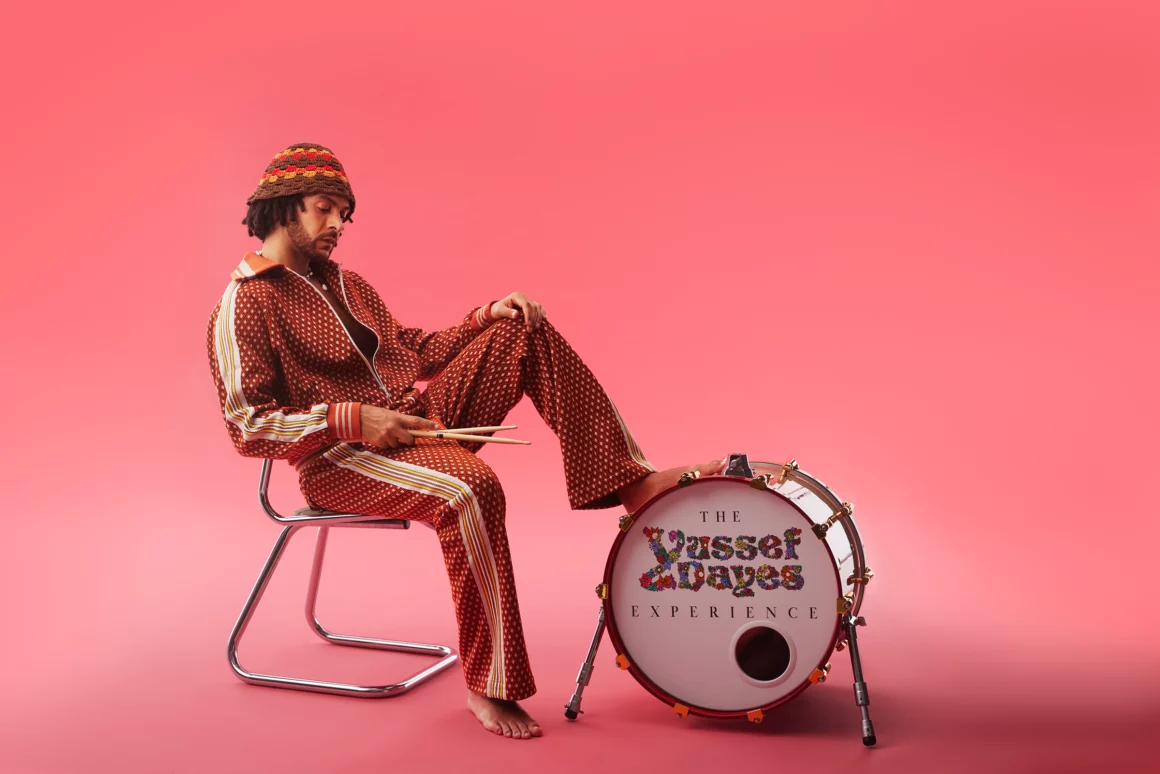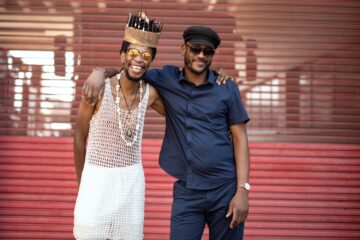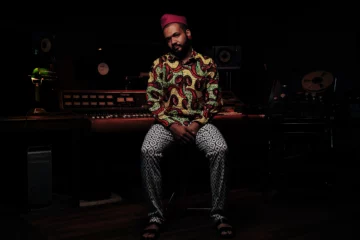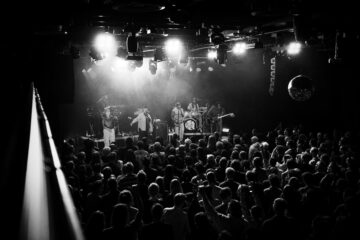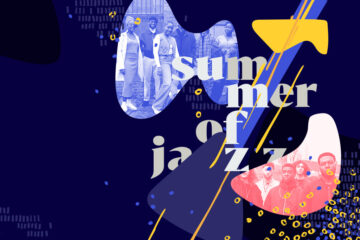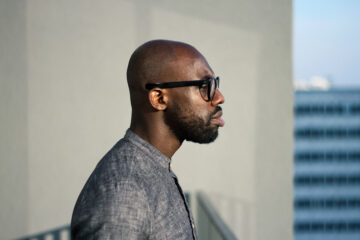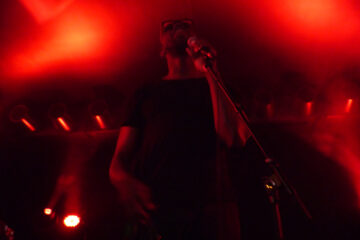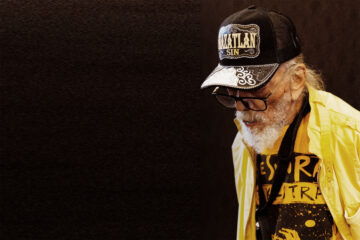»Now is my moment«, Dayes tells HHV in a Zoom call. It’s the moment he’s been drumming toward like a man possessed for years — whether with on »Black Focus« with Kamaal Williams or via Blue Note with Tom Misch, as United Vibrations group among brothers or in front of Billy Cobham’s teaching eyes. It’s no surprise that those who shine in the contemporary jazz field went into the studio with Dayes years ago. Today, he invites them himself.
»Black Classical Music« may be Dayes’ solo debut, even if, besides his inner circle around Rocco Palladino, Venna and Tom Misch, an ancestor like Shabaka Hutchings is also involved. But for the first time it is only Dayes’ point of view. That’s why Dayes looks from the cover —grim and with a giant afro he stands there as a young boy on the porch of his parents’ house. »Good times«, he says. »Just me and my drums among my mom’s plants.«
A lot of time has passed since then. In the meantime, Dayes has started his own family. He still lives in South London, drives a fancy car, and will soon be playing a sold-out show at the Royal Albert Hall. And yet, as he claims, he’s only just getting started. Because — and here he switches one last time to the third person — »the story of Yussef Dayes« is far from over.
At 4 years, you had the choice between an electric car and a drum kit, you said in an old interview. Where would you be now if you had chosen the car?
Who knows? I might have been a Lewis Hamilton racing Formula 1 tracks. To be honest, though, I was always choosing the drum kit. I never questioned it, even as a kid — when an electric car seemed more exciting.
What car do you drive today? A black Focus?
No, I drive a black Jaguar.
Have you ever been thinking about what success means to you?
Hm, I don’t really think about success. I’m just trying to keep the hunger. That’s because I’ve always had a maverick and underdog story in my head. So, I have had to work extremely hard to get to the point where I am now. I remember a few months ago people were telling me, now that your album is coming out, you can take some time off, right? I am like, what do you mean? I still have to make all the videos, I have to rehearse for the tour, promote and travel — all these crazy amount of work that people don’t necessarily understand as being a part of a musician’s life.
»So, I am not so much fixated about being successful. I just want to make wicked rhythms and incredible music. «
Yussef Dayes
I’m asking because you were successful from a rather young age.
My people knew what I was doing, and they would let me know, sure. At school, it was different. There were other drummers who were good. I don’t see music as a competition, though. Of course, as a kid, you want to be the best drummer in the world, but as I got older, I realized that I don’t have one favorite drummer — I got loads of favorite musicians. So, I am not so much fixated about being successful. I just want to make wicked rhythms and incredible music.
Has there ever been a moment in your life when you thought, fuck, I need to reevaluate what I do?
That’s why the album cover shows me as a kid. I want to remind myself of that childlike mentality. When I first got my drum kit, I didn’t think about the future. I loved the energy and passion because it made people dance. And the bass drum gives your belly a kick to this very day.
There has never been a moment when you felt like this probably doesn’t work out?
I had these moments, yeah. I played shows where two people were there — and then they left. But then I had gigs where 300 people were in a room, and they all went crazy, and you feel the energy is reciprocal. Sometimes you have to fight and pick yourself up. It’s about survival energy. I didn’t just get to the point where I am now, even if some people think so.
No matter what.
I may have questioned if music is going to give me a career. At the same time, I have never questioned that I am a drummer.
»It’s about survival energy.«
Yussef Dayes
Having 300 000 people following on Instagram and soon playing a sold out show in the most famous concert hall of the world helps a bit, right?
I am grateful that I have a platform and that I can grow it, but I try not to pay too much attention to those things because they are all just statistics and numbers that can detract from what you’re trying to do. If you start making music because you’re thinking of Spotify or whatever, you will compromise your initial feeling of why you get into the studio, create art and share it.
It’s still great to play the Royal Albert Hall, isn’t?
I’ve been performing since I was seven or eight. It’s When you get to a point where you can play arenas, it’s a blessing.
All that being said: How do you ensure that joy stays in the equation as a musician?
You got to realize that all these things never end. People want to be trillionaires and wouldn’t even be satisfied when they have enough money to buy a house and feed their family. So, I try to remind myself that I have air to breathe, water to drink and access to shelter. None of these things are granted for a lot of people on this planet. At the same time, I don’t make music to please everybody. Otherwise, I would just waste my time.
Sounds like you reflected a lot about that.
There’s so much more I’m missing out on because I’ve closed my mind off to thinking that I’m doing really well, and I’m a wicked drummer. I just want to learn some next rhythms and get to know other maestros to learn from. You know, life is limited. It’s easy to have your belly full. But I never stop, I am striving for more.
»Black Classical Music« is your first solo record. There are a lot of people on it, though. How does it differ from collaborative projects you had before?
All these records are my babies as well. That’s my work and my love that went into these projects. With »Black Classical Music« I can be unapologetic with a narrative that I want to share. It’s not that I was compromised with previous collaborations, but then again, with collaborative projects you always share various stories. I am at a point in my life where I want to tell people the Yussef Dayes story.
Why was it important to you to call it »Black Classical Music«?
My family, my upbringing, the lineage of people that I’ve been inspired by — which is an endless list from Miles Davis to John Coltrane, Billie Holiday or Sade — all of that laid the path for me to walk. At the same time the title highlights my classical influence whereas having a string orchestra on some tracks, the fact that I used to learn classical piano, listened to Beethoven and Mozart and went to classical concerts at the Barbican. »Black Classical Music« ties all these elements together because I’m much more than a jazz drummer playing West African rhythms.
Do you think that people might interpret it differently?
Oh, definitely. I will not limit its potential by telling people how to interpret it, though. This album has many different meanings. It’s up to you what you want from it. And that’s the beauty of instrumental music. You can hear the rhythms and soundscapes and feel what you want to feel.
What do you feel?
If you break down the rhythms, you can hear it. They are influenced by my time in New Orleans, Salvador, Senegal and Saint Lucia. I also grew up in South East London, which is a melting pot for people from around the world. All these experiences boil down to the feeling of the record.
It’s like a canon of places.
But then it’s so much more. I read Miles Davis’ autobiography and a lot of old interviews with Nina Simone and Rahsaan Roland Kirk. They all put a big question mark over this term jazz because it was not only limiting to them, but also damaging their careers. The music was more than this one word. They called it beautiful black music. I am trying to continue this lineage.
»And in the story of planet Earth, this little piece of music can be a puzzle for a generation in 100, maybe even 200 years time.«
Yussef Dayes
Asher Gamedze, a drummer from South Africa said that you can always tell what was going on socially at the time the music was recorded. What is going on in your music?
We talked about my journey and the different albums people might have heard me from. With this record, the volcano explodes — you hear Yussef Dayes set of things. I want to represent a moment because I am the moment. There is no point in replicating something that was done 60 or 70 years ago. Sure, we do our covers and show our odes to them. When it comes to recording music, though, I need to record the feeling of the exact time I am living in. That doesn’t mean that I am not thinking about the past while I am in the zone because I do. Loads of memories fuel this present moment. The way it was recorded — with analogue equipment and on tape — it means it has a longer lifespan. Whether people hear this now or in 200 years, it will still have relevance and meaning.
Do you think people will listen to this in 200 years and say, this is a classic?
It’s not the intention, but I hope so. One of my best friends recently passed away, he left all this amazing music of him rapping. I can now hear his voice and his story. It lives on. That’s why you can hear my daughter on the record. Sometimes in the future she will listen to it and realize that this is her past. And in the story of planet Earth, this little piece of music can be a puzzle for a generation in 100, maybe even 200 years time.
I understand the video with the old camera aesthetics a lot better now.
It feels real because it’s my real life, my people — together we share a path. After all, I am just a drummer. I don’t want to overcomplicate things or change the world. Sure, I would love them songs to something that children can learn, »Raisins Under The Sun« or »Tioga Pass« for example. But it’s not like I am teaching.
A lot of people say they want to change the world with their music. You do not.
I can act like I’ve got the answer for everything, but I don’t. I am keen to grow and to learn, go to Brazil to learn some samba or to Jamaica to get my reggae down. If you keep your head open, there is so much potential in everything.

